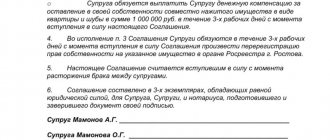Division of marital property: procedure, determination of share
When conflict situations arise in the family and living together becomes impossible, the spouses decide to end their relationship. Any breakup is a stressful situation for both spouses, because when embarking on the path of marriage, few people think that this relationship can lead to a breakup. A particular difficulty in officially dissolving a relationship is the division of property. A lot of controversial issues may arise during the division of property. If the spouses cannot solve this problem mutually, then one of them needs to solve it in court to protect their rights and interests
Valuation of property when dividing marital property
An independent real estate valuation is necessary for:
- determining the amount of state duty;
- precise division of disputed objects.
This procedure is required first of all by the plaintiff when going to court. But if the defendant does not agree, he can order his own assessment. The list of value determination includes disputed objects that are jointly owned.
When concluding an agreement, there is no need to conduct an assessment, because spouses determine the contract amounts independently.
What are the signs of general and personal property?
Roughly speaking, the main criterion for common property is the time of its acquisition. If a husband or wife acquired something during their official marriage, then this something is community property.
Common property includes:
- Wedding gifts, gifts presented during cohabitation;
- Items purchased during marriage;
- Things acquired before marriage, but to improve the original condition of which, funds earned during marriage were used.
Personal property includes:
- Gifts given before marriage;
- Inheritance;
- Property purchased before marriage.
In these cases, there is also a clause that if the spouses’ funds were invested in things considered personal property and their value increased, then they automatically cease to be personal.
Conciliation procedure
Determination of shares when dividing property of spouses is carried out by the spouses independently. They have the right to deviate from the equality of shares if such an “exchange” suits them. This is convenient when we are not talking about expensive property, or when both spouses are wealthy and therefore there will be no obstacle for them in dividing the cost of the property.
Under such an agreement, for example, most of the property can go to one spouse, and the second will receive something fundamentally important for him. For example, M.’s family decided to divide the property, and according to the agreement, the wife became the owner of the apartment and the car, and the husband received a dacha near Moscow. In monetary terms, the shares of the spouses were distributed as follows:
- 70% of the property went to the ex-wife;
- 30% of the property went to the man.
Since the agreement is certified by a notary, challenging it is quite problematic. But if a document puts one of the spouses in a deliberately disadvantageous position, it will still be possible to review it in court.
Spouses' shares
The constitutional principle of equality is enshrined at the legislative level between spouses in marriage. A husband or wife cannot be better on social or religious grounds, depending on their nationality or the amount of money they earn. Even if one of the spouses has never worked for good reasons, this does not deprive him of his share in the joint property.
The RF IC provides for the right to an equal share of spouses in joint property. In defense of women who, throughout their entire marriage relationship, did not work and were engaged in housekeeping and raising children, it should be noted that their shares in joint property do not decrease.
Family property
When concluding a marriage contract, the husband and wife independently choose the ownership regime, as well as the distribution of shares (if this arises from the agreement). In other cases, all property acquired by spouses falls under Article 33 of the RF IC and is joint property. The only exception is property that is personal, and is described in Article 36 of the Family Code of Russia:
- acquired by a spouse in a gratuitous transaction;
- purchased (earned, acquired in any other legal way) before marriage;
- personal items (clothing, razor, etc.);
- rights to the result of intellectual activity;
- targeted cash payments (compensation for damage to health, etc.).
Joint property means that each spouse owns 50% of the property. But this same share can be either reduced or increased.
Situations of changes in the share of spouses, judicial practice
Circumstances that influence changes in the share of spouses are provided for at the legislative level. In order to solve the problem of division of property between husband and wife, it is actually necessary to go to court. If the value of the property exceeds 50 thousand rubles, then it is necessary to file a claim for division of property in a federal court; if it does not exceed, then in a world court.
It is necessary to go to court with a statement of claim and evidence of both property and the reasons for reducing or increasing the share of one of the spouses.
Paragraphs 2 and 3 of Article 39 of the RF IC stipulate what arguments the judge needs to pay attention to in order to change the share of the spouses:
- Having children;
- Spending joint funds to the detriment of the interests of the family and the family budget;
- Disability or illness;
- If one of the spouses did not work for unjustified reasons.
Let's consider several options from judicial practice
For example, a husband and wife have been married for 16 years. They have two children together. When dividing property, the plaintiff, the father of the family, filed a claim for the division of the apartment purchased by the spouses during marriage. The defendant was not against the division, but asked the court to increase her part of the apartment due to the fact that the children remained living after the breakup with her. In resolving this issue, the court paid attention not only to the fact that the children lived with the defendant, but also to whether the parties to the process had additional housing, whether they both worked during the marriage, if they did not work, then for what reasons, whether the defendant fulfilled her maternal obligations. responsibilities in full. When deciding each issue, the judge must rely not on unfounded facts, but on documents, testimony of witnesses, etc. In this case, after studying the case materials, the court decided to change the defendant’s share in the joint apartment from ½ to 2/3.
Things are more complicated when deciding on the division of indivisible property, then in practice one of the parties receives things in kind, and the other receives financial compensation. When deciding questions about the actual division of property, the court relies on the wishes of the parties. If there are no wishes, or the spouses cannot come to a joint consensus, then the court independently determines which property is more necessary for whom after the divorce. If one of the parties is transferred things whose value exceeds the share of this party, then the court obliges this participant to financially compensate for the difference.
If spouses share property that was purchased with joint money but for the child, for example, a piano for music lessons, or a saxophone, then the court will leave these things with the spouse with whom the child will live.
Debts in the common property of spouses are also divided in proportion to their shares. In this case, facts are taken into account, such as whether the loan agreement was signed jointly, whether the other half knew about the debts of the first, whether the debt was taken to the detriment of the family.
Division of an apartment between spouses
It may also be impossible to divide real estate into marital shares. For example, if the dispute is about a room in a communal apartment or a one-room living space, then division is possible only in kind. The share of one participant in the process is assessed by an independent company selected by the court, and it is proposed to pay the spouse who remains living in the apartment or house. The processes last a long time and with varying success, since each party provides its rights to live in an undivided living space.
As a rule, the right of residence is granted to a woman with a young child. The presence of another living space for one of the parties to the dispute is of great importance. Other arguments are taken into account, for example, the inability to pay the share due to low material income. All disputes regarding division cease when the parties are asked to sell the property and divide the funds. You can sabotage the decision for quite a long time, oppose the executive bodies and not vacate the living space.
Particular difficulty in dividing the property of spouses arises if the apartment is pledged to the bank and is a mortgaged property. Banks are extremely reluctant to change an agreement when, instead of one document, two independent agreements will be required. Since in this situation another interested party is involved in the section, processes are not carried out without representatives of the bank.
In practice, the credit institution requires the borrower to close and fulfill its obligations through refinancing or other convenient means. The inability to pay off all mortgage obligations at once leads to the apartment being taken by the bank, sold, and the remaining balance after covering the debt is divided among citizens according to the specified share ratio. Most mortgage agreements describe the division of property and specify the requirements for the borrower.
Division of marital property by the court according to new rules
Share:
Voluntary partition order
When the husband and wife themselves have agreed to settle all their property issues, they can divide the family property voluntarily, without resorting to the courts. To do this, the agreements reached must be recorded in writing by concluding a division agreement. This document must be executed exclusively through a notary (Clause 2, Article 38 of the Family Code of the Russian Federation).
If an agreement is drawn up without notarization, the document will not acquire legal force. If the ex-husband or wife refuses to comply with his conditions, the property will have to be divided through the court on a general basis.
By agreement, a husband and wife can provide for any conditions for the division of marital property that suit both of them. It is impossible to refuse the division fixed by the agreement without the consent of the other party. If any of the former spouses subsequently refuses to fulfill the obligations assumed in the executed agreement, they may be forced to comply through the court.
Arbitrage practice
Ryumina A.Yu. filed a claim for assignment to ex-husband Ryumin Yu.P. obligations to fulfill the agreement they concluded on the division of marital property, namely the re-registration of an apartment for it and the payment of compensation in the amount of 2,000,000 rubles. for a residential building. Ryumin Yu.P. He did not agree with the demands of his ex-wife, confirming that during the divorce between him and Ryumina A.Yu. an agreement was actually concluded, which was certified by a notary. He explained that he was now married, he has a different family, the conditions of the previously concluded partition are no longer satisfactory, and he does not want to fulfill it.
The court granted the application of Ryumina A.Yu., indicating in the decision that the party that entered into an agreement on the division of property does not have the right to refuse its execution. Subsequent disagreements with previously assumed obligations do not cancel the legally executed document.
A little about debts
Often, determining the share in property is necessary not for the actual division of property, but for determining responsibility for family debts. After all, clause 39 of the RF IC indicates that the total debt is divided into each of the spouses in proportion to the shares acquired as a result of the division.
Thus, if the wife wants to receive a larger share of the property because the children will live with her, she will also acquire a larger share of the obligation. For example, Veronica Sh., when dividing property, demanded through the court to increase her share, since she had young children left with her. But she did not take into account that the family had a debt of 500,000 rubles. The court awarded the woman 65% of the family property. And therefore she had to pay 325 thousand rubles. on loan obligations.
Due to frequent updates to legislation and the legal uniqueness of each situation, we recommend obtaining a free telephone consultation with a lawyer. You can ask your question by calling the hotline number 8 (800) 555-40-36 or write it in the form below.
Judicial practice under Article 39 of the RF IC:
Decision of the Supreme Court: Determination N 16-КГ15-35 of 12/22/2015 Judicial Collegium for Civil Cases, cassation
Decision of the Supreme Court: Determination N 58-КГ15-11 of 09/15/2015 Judicial Collegium for Civil Cases, cassation
Decision of the Supreme Court: Determination N 31-КГ15-7 of 09/08/2015 Judicial Collegium for Civil Cases, cassation
Decision of the Supreme Court: Determination N 69-КГ13-3 dated September 24, 2013 Judicial Collegium for Civil Cases, cassation
Decision of the Supreme Court: Determination N 21-КГ16-9 dated November 29, 2016 Judicial Collegium for Civil Cases, cassation
Decision of the Supreme Court: Determination N 41-КГ16-28 of 09/13/2016 Judicial Collegium for Civil Cases, cassation
Decision of the Supreme Court: Determination N 5-КГ14-162 of 03/03/2015 Judicial Collegium for Civil Cases, cassation
Decision of the Supreme Court: Determination N 18-КГ17-134 of 09/19/2017 Judicial Collegium for Civil Cases, cassation
Decision of the Supreme Court: Determination N 15-КГ14-7 dated December 16, 2014 Judicial Collegium for Civil Cases, cassation
Decision of the Supreme Court: Determination N 41-КГ15-11 of 07/14/2015 Judicial Collegium for Civil Cases, cassation
- First
- «
- Last
Comments ()
Judicial procedure for partition
When a husband and wife are unable to resolve disputes on their own, the common property of such spouses is divided with the help of the court.
Statement of claim
To initiate a lawsuit, a statement of claim must be filed by the husband or wife.
The application must state the circumstances of the case, list the jointly acquired property, and determine what the plaintiff requires to allocate to his property.
Attach copies of marriage and divorce documents, property, and other documents to the claim, depending on the specifics of the situation.
You can draw up an application using a sample or by seeking advice from a lawyer or lawyer.
When filing an application, you must pay a state fee, which is calculated based on the value of the property that the plaintiff asks the court to transfer to his ownership.
Jurisdiction
When the total value of the property claimed by the plaintiff does not exceed 50,000 rubles, it is necessary to submit documents to the magistrate (Article 23 of the Civil Procedure Code of the Russian Federation). If this amount is exceeded, you must apply to the district court (Article 24 of the Civil Procedure Code of the Russian Federation).
According to the general rules of territorial jurisdiction, the claim is filed with the court at the defendant’s residence address (Article 28 of the Civil Procedure Code of the Russian Federation).
Article 29 of the Civil Procedure Code of the Russian Federation establishes the following exceptions:
- Filing at the plaintiff’s residence address if claims for alimony are simultaneously filed.
- Submission at the location of the property - when dividing such an object.
In the presence of the above circumstances, the plaintiff himself decides which court he will submit his application to.







